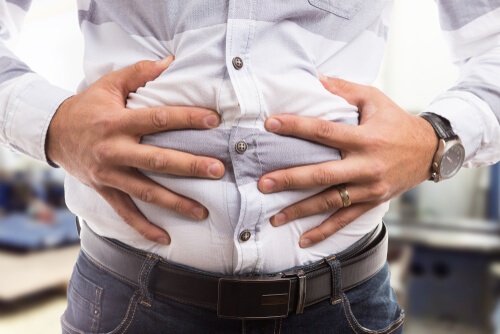
Constipation
What is constipation?
Constipation is:
• Hard, often very small stools
• Infrequent bowel movements
or
• A feeling of unsatisfied emptying of the bowel.
Possible symptoms:
- Straining to pass stools
- Having to sit on the toilet much longer than usual
- Bloated, uncomfortable abdomen
- Abdominal cramps.
What are the causes ?
It is mainly caused by simple things such as:
- Neglecting the habit of attending the toilet
- Not responding to ‘nature’s call’
- Change in routine (e.g. travelling)
- Overuse of laxatives
- Overuse of painkillers
- A poor diet with a lack of fibre
- Lack of exercise
- Insufficient fluid intake
- Getting older.
Apart from slack habits, there are other important causes, such as bowel cancer, drugs, thyroid disease, depression, anorexia nervosa and lead poisoning. Any medicine that you are taking should also be suspected of causing constipation. Pain-killing opioids, especially codeine, are a major problem.
What are the risks?
Constipation can cause a lot of discomfort in the stomach and rectum and may cause blockage of the bowel. This can manifest as impaction of hard faeces with overflow incontinence of liquid faeces. It can lead to problems of the anus such as piles, fissures, rectal prolapse and itchiness, and to hernias.
Useful hints to avoid constipation
Activity
Adequate exercise, especially walking, is important.
Diet
- Take plenty of fluids, especially water and fruit juices (at least 2 litres a day). Eat foods that provide bulk and roughage, for example, vegetables and salads, cereals (especially bran),fresh and dried fruits, and whole meal bread.
- Some examples of food with good bulk (from least to most) are potatoes, bananas, cauliflower, peas, cabbage, lettuce, apples, carrots andbran.
- Fruit has good fibre, especially in the skin, and some have natural laxatives (e.g. prunes, figs, rhubarb, apricots).
Habit
- Answer nature’s call to empty your bowels as soon as possible.
- Develop the after-breakfast habit. Allow time for a good relaxed breakfast and then sit on the toilet (up to 10 minutes if necessary) while reading! Eat meals slowly in a relaxed manner at regular times.
Laxatives
If laxatives are necessary, your doctor may recommend one of the hydrophilic bulk-forming agents, such as isphagula and psyllium, or an osmotic laxative such as macrogol, lactulose or other appropriate therapeutic agent. Of these, macrogol(Movicol) is extremely effective for chronic constipation.
Important points
- If an obvious change occurs in your bowel habit, consult your doctor for advice.
- Bowel regularity can vary from person to person. Some people believe that just as the earth rotates on its axis once a day, so too should their bowels open daily to ensure good health. This may be ideal, but it can be normal to ‘go’ every second day or even twice a week.
Topic: General Medicine








Leave a comment